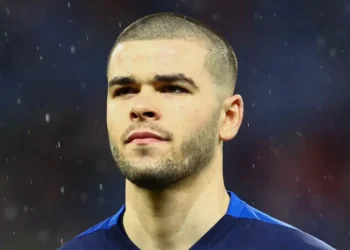Former Arsenal academy prospect and professional footballer Jay Emmanuel-Thomas has been released on parole after serving only ten months of a four-year jail term, a development that has sparked widespread debate about sentencing, rehabilitation, and the legal system’s treatment of public figures.
Emmanuel-Thomas, once touted as one of Arsenal’s most promising young talents, saw his career take a sharp downturn over the past few years, ultimately culminating in the criminal conviction that led to his incarceration. Although the specific details of his offence have been kept relatively low-profile in the public domain, reports indicate that it was serious enough to warrant a four-year custodial sentence—a term that many now feel has been drastically shortened by his early release.
His sudden parole has drawn mixed reactions from the footballing community, the public, and legal commentators. Some believe that his early release demonstrates the justice system’s commitment to rehabilitation, arguing that time served behind bars is not the only measure of accountability. Good behaviour, engagement with prison programs, and evidence of genuine remorse can all contribute to parole board decisions.
However, critics argue that serving just ten months of a four-year sentence risks sending the wrong message about consequences and privilege. Many fans and social media commentators have questioned whether Emmanuel-Thomas’ status as a well-known sports figure played any role in his perceived lenient treatment, though the parole board has maintained that standard procedures were followed in his case.
Jay Emmanuel-Thomas’ career has been a story of unfulfilled potential. He came through the ranks at Arsenal, captaining the youth teams and earning praise for his physical presence and technical skill. Though he made a handful of appearances for the senior team, he struggled to secure a regular place in Arsène Wenger’s squad, leading to a series of loan spells and moves across lower-tier clubs in England and abroad.
He played for clubs including Ipswich Town, Bristol City, Queens Park Rangers, and even had a stint in Thailand and Scotland with Aberdeen. But off-the-pitch troubles increasingly overshadowed his performances, and his later years in football were marked by inconsistency and controversy.
The question now is whether Emmanuel-Thomas, still only in his early 30s, can salvage any part of his footballing career. In the modern game, examples exist of players returning after serving time in prison, but the path is never easy. It remains to be seen whether any clubs will be willing to take the risk of offering him a contract. His ability to regain match fitness and restore public trust will be crucial hurdles to overcome if he hopes to make any sort of comeback.
Some former teammates and coaches have expressed cautious support, highlighting that everyone deserves a second chance if they show a commitment to change. Others remain sceptical, arguing that football is a privileged profession that should not welcome back individuals who have committed serious offences without clear evidence of reform.
Emmanuel-Thomas has yet to make a public statement since his release, but those close to him suggest he is focused on reintegrating into society and making amends for past mistakes. Rumours persist that he may pursue coaching badges or youth mentoring roles, aiming to use his experience as a cautionary tale for young players facing similar pressures and temptations.
His release also shines a light on broader conversations about how young athletes, often thrust into the limelight with fame and wealth at an early age, can lose their way without proper guidance and support. Many feel that his story is symptomatic of an industry that does not always do enough to prepare young stars for life both during and after football.
While public opinion remains divided, one fact is clear: Jay Emmanuel-Thomas’ name will not fade quietly into the background. Whether he rebuilds his life constructively or drifts further from the sport that once gave him so much promise will depend largely on the decisions he makes in the critical months ahead.
For now, all eyes will be on his next move, as the former Arsenal prospect steps back into freedom under the watchful gaze of a public keen to see whether redemption is truly possible when the final whistle has already blown on a caree
r once so full of hope.











